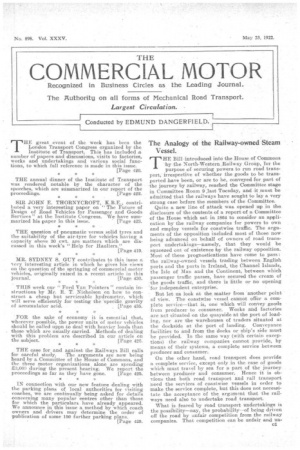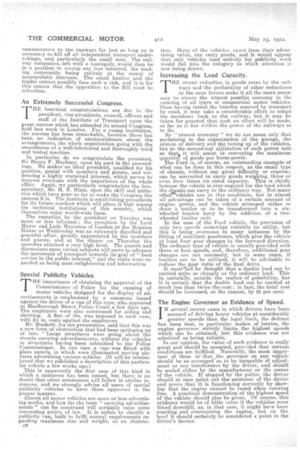The Analogy of the Railway-owned Steam Vessel.
Page 1

Page 2

If you've noticed an error in this article please click here to report it so we can fix it.
THE Bill introduced into the Rouse of Commons by the North-Western.Railway Group, for the purpose of securing powers to run road transport; irrespective of whether the goods to be transported have been, or are to be, conveyed for part of -the journey by railway, reached the Committee stage in Committee Room 9 ,last Tuesday, and it ,must be admitted that the railways have sought to lay a very strong case before the members of the Committee. Quito a new line of attack was opened up in the disclosure of the contents of a report of a Committee of the House which sat in 1864 to consider an application by th.e railway companies for powers to own and employ vessels for coastwise traffic. The arguments of the opposition included most of those now being advanced on behalf of owners of road transport undertakings—namely, that they would be squeezed out of existence by the railway opposition. Most of these prognostications have come to pass: the railway-owned vessels trading between English ports and the ports in Ireland, the Channel Islands, the Isle of Man and the Continent, between which passenger traffic passes, have secured the cream of -the goods traffic, and there is little or no opening for independent. enterprise.
But let .us look at the, matter from -another point of view. The coastwise vessel cannot offer a complete service—that is, one which will convey goods -from precluc.er to consumer, Works and factories
are not situated on the quayside at the port .of load,. ing, nor are the warehouses of traders situated at the dockside at the port of landing. Conveyance facilities to and from the docks or ship's side must be provided. In the same way (with certain exceptions) the railway companies cannot provide, by means of their systems, a complete service between producer and consumer.
On the other hand, road transport does provide a complete service, except only in the case of goods which must travel by sea for a part of the journey between producer and consumer. Hence it is obvious that both road transport and rail transport need the services of coastwise vessels in order to make the service complete, but this does not necessitate the acceptance of the argament that the railways need also to undertakeroad transport.
What is feared by road transport undertakings is the possibility—nay, the probability—of being driven off the road by unfair competition from the railway companies. That competition can be unfair and un
remunerative to the railways for just so long as is necessary to kill off all independent transport undertakings, and particularly the small men. The railway companics,•left with a monopoly, would then be in a position to recoup any loss incurred, the trading community being entirely at the mercy of monopolistic interests. The small haulier and the trader cannot possibly face suchh-a risk, and it is for this reason that the Opposition to the Bill must be relentless.
An Extremely Successful Congress.
THE heartiest congratulations are due to the . president, vice-presidents, council, officers and staff of the Institute of Transport upon the great success which has attended its second Congress, held last week in London. For a young institution, the success has been remarkable,. because there has been no indication of amateurishness about the arrangements, the whole organization going with the smoothness of a well-lubricated and thoroughly tried and tested machine.
In particular do we congratulate the president, Sir Henry P. Mayhury, upon his part in the proceedings. He makes an ideal president, qualified for his position, genial with members and guests, and evidencing a highly sustained interest, which serves to impress everyone with the importance of the whole affair. Again, we particularly congratulate the hon. secretary, Mr. H. E. Main, upon the skill and initiative which have gone so far to make the Congress the success it is. The Institute is establishing precedents for its future conduct which will place it high among the technical institutions of this country, which themselves enjoy world-wide fame. The reception by the president on Tuesday was more or less informal ; the reception by the Lord Mayor and Lady Mayoress of London at the Mansion House on Wednesday was an extremely dignified and graceful-affair, greatly appreciated by the members and guests, and at the dinner on Thursday the speeches attained a very high level. The papers and discussions upon varied subjects will serve to advance the movement of transport towards its goal of ". best service in the' public interest," and the visits were regarded as being most enlightening and informative.
Special Publicity Vehicles.
THE importance of obtaining the approval of the Commissioner of Police for the running of motor vehicles designed for the display of advertisements is emphasized by a summons issued against the driver of a van of this type, who appeared at Marlborough Street Police Court a few days ago. The employers were also summoned for aiding and abetting. A fine of 1.0s. was imposed in each case, with £4 45. costs against the employers. Mr. Muskett, for the prosecution, said that this was a new form of obstruction that had been springing up of late. 'Large structures were going a-bout the streets carrying advertisements without the vehicles or structures having been submitted to the Police Commissioner. In one case a van, was fitted with glass panels, in which were illuminated moving pictures advertising various articles. (It will be remembered that we published a description of this particular vehicle a few weeks ago.)
This is apparently the first case of this kind in which a summons has been issued, but there is no doubt that other summonses will follow in similar instances, and we strongly advise all users of special publicity vehicles to have them approved in the proper manner. Almost all motor vehicles are more or less advertising media, and how far the term "carrying advertisements" can be construed will 'certainly raise some interesting points of law. It. is unfair to classify a publicity van, built to fulfil normal requirements regarding maximum size and weight, as an obstruc 09
tion. Many of the vehicles, apart from their adyer. tising value, can carry goods, and it would appear that only vehicles used entirely for publicity work would fall into the category to which attention is now being drawn.
Increasing the Load Capacity.
THE recent reduction in goods rates by the railways and the probability of other reductions in the near future make it all the more necessary to secure the utmost possible economy in the running of all types of commercial motor vehicles. Once having tasted the benefits ensured by transport by road, it may take a considerable effort to tempt the merchant back to the railway, but it may be taken for granted that Such an effort will be made, so far as it lies within the power of the railways so to do.
By " utmost economy" we do not mean only that pertaining to the organization of the garage, the system of delivery and the tuning up of the vehicles, but to the economical utilization of each power unit. so that it will assist in conveying the maximum quantity of goods per horse-power.
The Ford is, of course, an outstanding example of what can be done in this respect, as the small, type of chassis, without any great difficulty or expense, can be converted to carry goods weighing three or even four times its rated capacity. This is chiefly because the vehicle is over-engined for the load which the chassis can carry in the ordinary way. Not many
other' i
vehicles are n this condition, but in almost all advantage can be taken of a certain amount of engine power, and the vehicle arranged either to draw .a trailer or to be transformed into a sixwheeled tractor lorry by the addition of a twowheeled trailer unit. In the case of the Ford vehicle, the provision of only two speeds somewhat restricts its utility, but this is being overcome in many instances by the fitting of auxiliary gearboxes, which give the vehicle at least four gear changes in the forward direction. The ordinary type of vehicle is usually provided with three or four speeds, and,. therefore, additional gear changes are not necessary, but in some cases, if trailers are to be utilized, it will be advisable to . reduce the gear ratio of the final drive.
It must'Soi be thought that a double load can be carried quite so cheaply as the ordinary load. This naturally, outside the nenlms of possibility, but it is certain that the double load can be carried at much less than twice the cost ; in fact, the total cost should be increased, at the utmost, by 25 per cent.
The Engine Governor as Evidence of Speed.
IN several recent cases in which drivers have been accused of driving heavy vehicles at considerably greater speeds than the legal limit, the defence has been that, in particular makes of lorries,, the engine governor strictly limits the highest speeds which can be attained, but this evidence was not • admitted as being reliable. In our opinion, the value of such evidence is really great and should be accepted, provided that certain conditions are fulfilled. Naturally, the most important of these is' that the governor on any vehicle should be so arranged asto be incapable of adjustment or any interference by the driver, and should be sealed either by the manufacturer or the owner of the vehicle. If stopped by the police, the driver should at once point out the existence of the device and prove that it is functioning correctly by showing that the engine cannot be raced when running free. A practical demonstration of the highest speed of the -vehicle should also be given. Of course, this evidence would be of little value if the vehicles were timed downhill, as, in that case, it might have been coasting and overrunning the engine, but on the level it should certainly be considered a point in the' driver's favour.






























